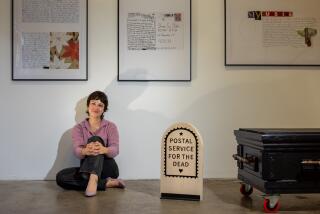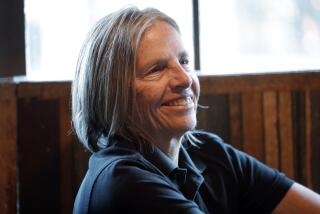THE LETTER LEFT TO ME <i> by Joseph McElroy (Alfred A. Knopf: $16.95) </i>
- Share via
Coming of age is an elusive process, often depicted as a familiar progression of seminal, sobering events, but actually happening when images settle somewhere in our mind, only slightly skewing our angle of perception but dramatically changing our outlook. The genius of “The Letter Left to Me” is its ability to chart these minute changes. Joseph McElroy knows when to set plot aside, narrowing his focus and slowing his pace during telling moments in the life of his narrator and protagonist, a 15-year-old boy who receives a letter from his father three days after his father’s death. McElroy devotes nearly 15 pages, for instance, to studying the young man as his “living, wildly valued mother” hands him the letter: “As I take the envelope, my thumb below my name, I just pick up elsewhere on the envelope her hand, her fingers, leaving it. Fingers of someone else . . . I feel his handwriting, his ‘hand.’ In mine.”
McElroy thus uses writing as a physicist might use an accelerator, to put us in touch with truths that, like atoms, are beyond the scope of everyday perception. Writing plays a similar role for the narrator’s father, for the letter reveals intimate truths the father could not tell his son in life: “If you occasionally have to give up something you desire greatly at the moment,” the father writes, “try to remember that, however keen the disappointments of youth may seem, there is nothing as bitter as a middle-aged man’s realization that he doesn’t amount to much.”
In a strange turn of plot, the narrator’s family prints 200 copies of the letter and sends it to friends; even more bizarrely, the young man finds the letter everywhere when he goes to college. The mystery eventually unravels as McElroy illuminates the ways grief and love can disguise possessiveness. The letter, of course, implicitly asks the son to do better than his father, a challenge the young man initially accepts, feeling “alive as a voluptuous wind around me waiting to be appreciated, with a position, a magnetic halo, a mind, to be assumed forever from then on.” Later, though, he feels trapped by expectations, caught in a cycle that might lead to a disappointment not unlike his father’s.
More to Read
The biggest entertainment stories
Get our big stories about Hollywood, film, television, music, arts, culture and more right in your inbox as soon as they publish.
You may occasionally receive promotional content from the Los Angeles Times.










